
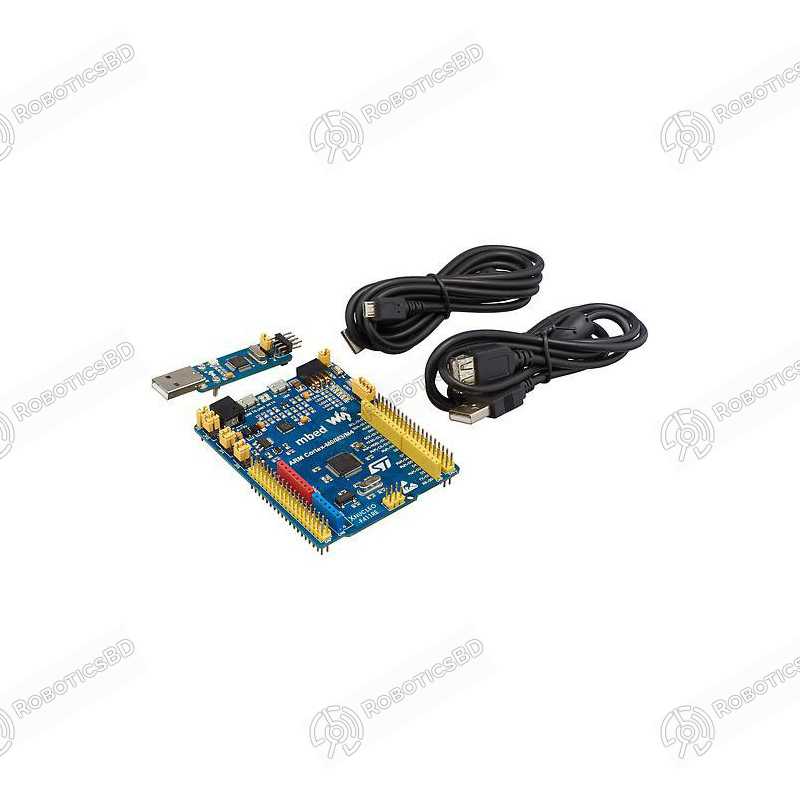






 Store Pickup Available!
Store Pickup Available!
 Free Ship Over 5000 BDT
Free Ship Over 5000 BDT
 Quality Product
Quality Product
 No Warranty
No Warranty
 No Replacement
No Replacement
Waveshare XNUCLEO-F103RB, Improved STM32 NUCLEO Board. Featured By RoboticsBD.
Product Images are shown for illustrative purposes only and may differ from the actual product.
RoboticsBD RoboticsBD RoboticsBD RoboticsBD RoboticsBD RoboticsBD RoboticsBD RoboticsBD RoboticsBD RoboticsBD
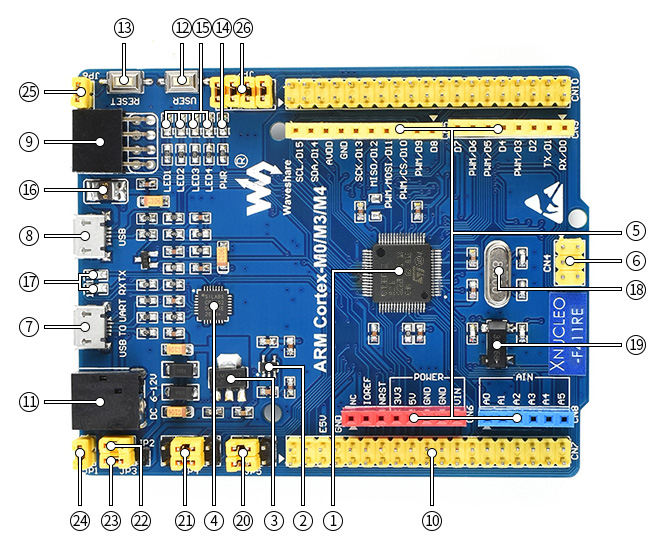
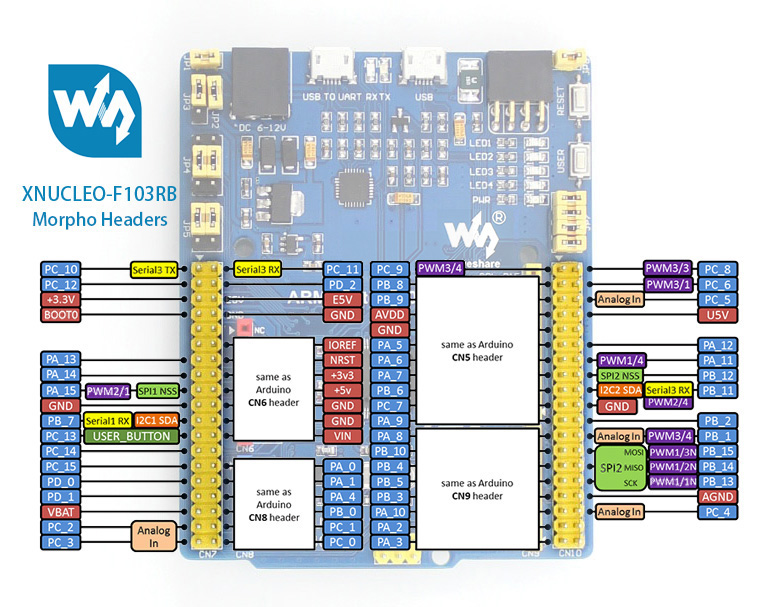
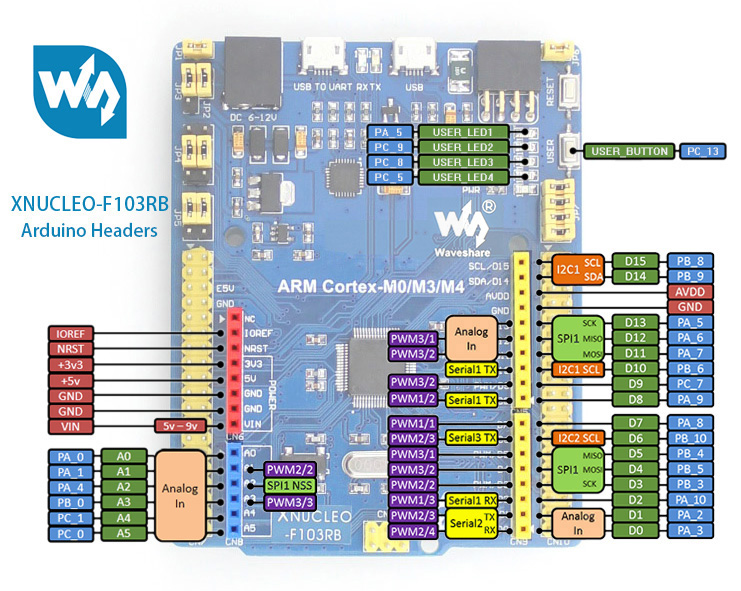
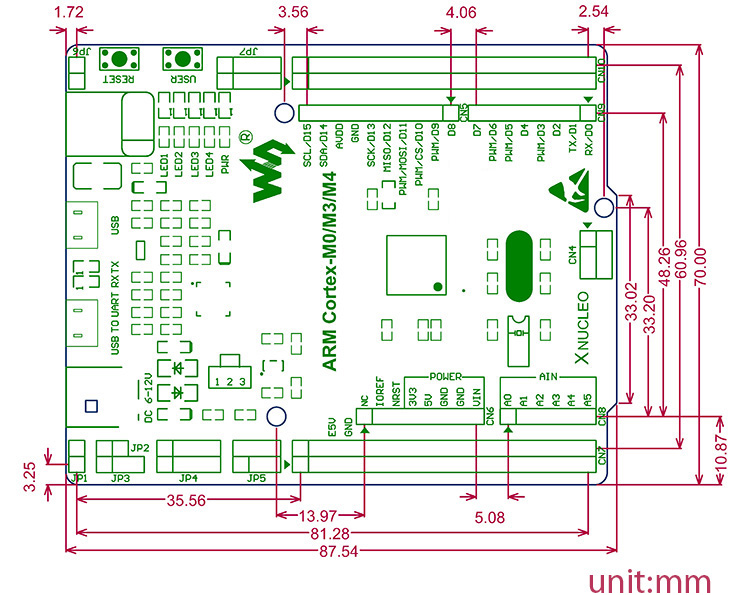
RoboticsBD RoboticsBD RoboticsBD RoboticsBD RoboticsBD RoboticsBD RoboticsBD RoboticsBD RoboticsBD RoboticsBD
| General Specification | |
| Arduino compatibility | XNUCLEO can be configured by jumper to compatible with UNO (default) or Leonardo |
| Arduino ICSP interface | ICSP is required by certain kinds of shields |
| USB connectivity | The USB connector of NUCLEO is for debugging ONLY, not available for USB connection |
| USB connector | Micro USB is the advanced USB standard |
| Morpho headers mark | Now you can check the PCB mark instead of datasheet |
| Common interfaces are connected via | Jumpers are much easier to use, need no soldering |
| UART debugging | The NUCLEO integrated ST-LINK/V2 functional chip can be simulated as serial port, however, it's not available while in-circuit debugging, whereas XNUCLEO features a stand-alone USB TO UART chip. |
| 8MHz crystal | Timer is more accurate when using external 8MHz crystal |
| 32.768KHz crystal | Required for RTC |
| USB fuse | The computer USB interface might be harmed without fuse |
| LEDs | The more LEDs, the easier to monitor program running status |
| UART indicator | Data communication is visible now |
| DC input | A convenience |
| Button position | The button won't be untouchable when connecting with an Arduino shield if it were close to the PCB edge |
| ST-LINK | ST-LINK can be used anywhere else |
| Shipment Weight | 0.210 kg |
| Shipment Dimensions | 14 × 14 × 4.5 cm |
Please allow 5% measuring deviation due to manual measurement.
RoboticsBD RoboticsBD RoboticsBD RoboticsBD RoboticsBD RoboticsBD RoboticsBD RoboticsBD RoboticsBD RoboticsBD
1 x XNUCLEO-F411RE - Improved STM32 NUCLEO Board.
RoboticsBD RoboticsBD RoboticsBD RoboticsBD RoboticsBD RoboticsBD RoboticsBD RoboticsBD RoboticsBD RoboticsBD
RoboticsBD RoboticsBD RoboticsBD RoboticsBD RoboticsBD RoboticsBD RoboticsBD RoboticsBD RoboticsBD RoboticsBD
The latest price of XNUCLEO-F411RE - Improved STM32 NUCLEO Board in Bangladesh is BDT 7,990 You can buy the XNUCLEO-F411RE - Improved STM32 NUCLEO Board at best price from our RoboticsBD or visit RoboticsBD Office.
|
Please note that the product information provided on our website may not be entirely accurate as it is collected from various sources on the web. While we strive to provide the most up-to-date information possible, we cannot guarantee its accuracy. We recommend that you always read the product labels, warnings, and directions before using any product. |
|
Product Images are shown for illustrative purposes only and may differ from the actual product. |

Reference: RBD-0350
100% Brand new and high quality STM32 Board Model: STM32F103C8T6. Core: ARM 32 Cortex-M3 CPU. Debug mode: SWD. 72MHz work frequency. 64K flash memory, 20K SRAM. RoboticsBD 2.0-3.6V power, I/O.
Reference: RBD-0704
3-axis high-performance MEMs gyros and 3-axis high-performance MEMs accelerometer. Tiny 36 x 36 mm 4 layer PCB for superior electrical noise reduction and flight performance. Software support for Windows, Mac, and Linux. Direct high-speed USB support with no drivers required, a true plug and play device. Spektrum satellite receiver support. Futaba S-BUS...
Reference: RBD-1102
PCB installed inside of aluminum alloy U disk shell, portable, safe and reliable! Interface definition directly marked on the shell, clear, convenient and practical! 5V, 3.3V offers at the same time, allowing you to program your target board with both 5V and 3.3V Shell characters using laser engraving, never fade off! Permanent clarity! 500MA internal...
Reference: RBD-1133
Compatible with NUCLEO-F411RE, onboard Cortex-M4 microcontroller STM32F411RET6 Arduino connectivity support, easy to connect with various Arduino shields and access the massive Arduino resources ST Morpho headers provide full access to all STM32 I/Os, easy for peripheral expansion Supports mbed, build prototype quickly by mbed SDK and online tools...
Reference: RBD-1531
The commissioning kit is based on the board STM32f429zit6 (180 MHz, 2 MB of Flash memory, 256 KB RAM, Cortex-M4F ARM). On-Board is also 3-axis gyroscope, touchscreen LCD 2.4" QVGA TFT and programmer / debugger ST-LINK/V2-B.
Reference: RBD-1808
Model: F407VE-512K STM32F407VET6 development board F407 microcontroller learning board STM32 system board
Reference: RBD-2131
ESP32-S2 based WIFI development board Features S2FN4R2 WIFI IC Equipped with 4MB FLASH and 2MB PSRAM Type-C USB connectivity 27 digital input/output pins with support for interrupt/pwm/I2C/single wire ADC, DAC, I2C, SPI, UART, USB OTG
Reference: RBD-1602
Microcontroller: ESP8266EX Operating Voltage: 3.3V Digital I/O Pins: 11 (all I/O pins have interrupt/PWM/I2C/one-wire capability, except for D0) Analog Input Pins: 1 Flash Memory: 4MB On-Board Switching Power Supply: Input Voltage Range: 9V to 12V Output: 5V at 1A Max
Reference: RBD-1110
Supports a wide range of ATMEL AVR microcontroller. Works with AVR Studio or WINAVR(GCC) Works with ATMEL AVR Studio 4.13
Reference: RBD-2242
Wearable e-textile technology. Designed with large sew tabs LED Yellow Color
Reference: RBD-0948
Built-in Flash: 32Mbit Power supply: 5V WiFi protocol: IEEE 802.11 b/g/n Peripheral interface: UART/GPIO/ADC/DAC/SDIO/PWM/I2C/I2S Logic level: 3.3V A high-quality USB cable is essential for this board to ensure sufficient current supply; otherwise, your board may not be recognized by the Windows Device Manager. Please avoid using mobile phone cables and...
Reference: RBD-1397
Programmer: CH340 Operating Voltage 5V Input Voltage (recommended) 7-12V Input Voltage (limits) 6-20V Digital I/O Pins 54 (of which 15 provide PWM output) Analog Input Pins 16 DC Current per I/O Pin 40 mA DC Current for 3.3V Pin 50 mA Flash Memory 256 KB of which 8 KB used by bootloader
Reference: RBD-0106
Description: Arduino is an open-source physical computing platform based on a simple i/o board and a development environment that implements theProcessing/Wiring language.
Reference: RBD-2241
Wearable e-textile technology. Designed with large sew tabs LED White Color
Reference: RBD-0094
The Arduino Uno R3 High-Quality Edition Arduino UNO in Bangladesh Micro-controller : ATmega328. Operating Voltage : 5V. Input Voltage (recommended) : 7-12V. Digital I/O Pins : 14 (of which 6 provide PWM output). Analog Input Pins : 6. The Arduino Uno R3 High-Quality Edition embodies superior craftsmanship and meticulous attention to detail, resulting in...
Reference: RBD-1820
38 Pin version 2.4GHz Dual-Mode WiFi + Bluetooth Development Board, 38PIN Ultra-Low power consumption works perfectly with the IDE A high-quality USB cable is essential for this board to ensure sufficient current supply; otherwise, your board may not be recognized by the Windows Device Manager. Please avoid using mobile phone cables and instead use the...
Reference: RBD-0136
Microcontroller: AT91SAM3X8E Operating Voltage: 3.3V Input Voltage (recommended): 7-12V Input Voltage (limits): 6-16V Digital I/O Pins: 54 (of which 12 provide PWM output) Analog Input Pins: 12 Analog Outputs Pins: 2 (DAC) A 32-bit core, that allows operations on 4 bytes wide data within a single CPU clock. CPU clock at 84Mhz 96KBytes of SRAM
Reference: RBD-2199
Compatible with the Arduino IDE, making it easy for beginners to start using Smaller and cheaper than traditional Arduino boards Powered by a 16.0 MHz microcontroller Fully assembled except for headers, allowing for easy soldering Great for projects where size and cost are a concern Perfect for beginners to jump into electronics Can be used for a variety...
Reference: RBD-1527
Based on ATmega32 8 Bit microcontroller USB external programmer Included Datasheet, Manual, Software & Sample codes All Port pins pins available for peripheral interfacing
Reference: RBD-2270
Powerful and versatile ESP32 SoC with WiFi and Bluetooth connectivity 4MB of flash memory and 520KB of SRAM for storing firmware and data Compatible with the Arduino development environment for easy programming Input/output pins for connecting to sensors, actuators, and other peripherals Can be programmed using MicroPython, a high-level programming...
Reference: RBD-1523
Microcontroller: ATmega328P Circuit Operating Voltage: 5V Clock frequency: 16MHz. 6 PWM port: D3, D5, D6, D9, D10, D11. Use For Atmel Atmega328P-AU microcontroller. Support serial download. Support 9V battery. A pair of TTL level serial port transceiver : RX / TX.
Reference: RBD-1603
USB-TTL converter. Logic Level: 5V. Operating Supply Voltage: 5V. Digital I/O Pins: 14. Analog I/O Pins: 6.
Reference: RBD-2267
Integrated Wi-Fi and Bluetooth connectivity make this board a great choice for IoT projects and robotics. The ESP32 chip on the board is a dual-core microcontroller that operates at up to 240 MHz, providing ample processing power for complex projects. With 520 KB of SRAM and 4 MB of flash memory, the board has plenty of memory for storing and running...
Reference: RBD-1821
Open-source, Interactive, Programmable, Low cost, Simple, Smart, WI-FI enabled Arduino-like hardware IO Integrated TR switch, balun, LNA, power amplifier and matching network Integrated PLL, regulators, DCXO and power management units Onboard USB to serial chip to easily program and upload codes from the Arduino IDE Easy to use breadboard friendly form...
Reference: RBD-2126
Manufacturer: China Support TWI and SPI communication Input voltage (recommended) range from 7V to 12V Input Voltage (limit) range from 6V to 20V 20 digital input/output pins (of which 7 can be used as PWM outputs and 12 as analog inputs) Onboard ATmega32u4 microcontroller with 32KB flash memory, 2.5KB SRAM and 1KB EEPROM
Reference: RBD-1407
Flash LED off: 180mA @ 5V. Flash LED on to maximum brightness: 310mA @ 5V. Deep-sleep: 6mA @ 5V min. Modem-sleep: 20mA @ 5V min. Light-sleep: 6.7mA @ 5V min. Programmer: ESP32-CAM-MB MICRO USB Download Module The ESP32 CAM does not come pre-assembled with the camera. You'll need to connect the camera ribbon cable to the board, a task which can be...
Reference: RBD-0658
Standard interface layout, compatible with a variety of Arduinos such as the Pro Mini Original FTDI FT232 chip, stable performance USB power has current protection, using 500MA self-restore fuse RXD/TXD transceiver communication indicator With power, sending, receiving indicator, working status LED indicators Mini USB Port Connection Support 3.3V, 5V...
Reference: RBD-2137
ESP32 Development Board Integrated antenna and RF balun Dual-mode Wi-Fi and Bluetooth chips Small size and high performance-price ratio Compatible with Arduino
Reference: RBD-1541
For beginners who are interested in Arduino A complete set of Arduino’s most common and useful electronic components Infrared sensor receiving module Laser sensor module Temperature and humidity sensor module Infrared sensor module 5v relay module Obstacle avoidance sensor module.
Reference: RBD-1216
14-/20-pin DIP (N) Socket 20 pin LaunchPad standard leveraging the BoosterPack ecosystem On-Board EZ-FET emulator featuring EnergyTrace™ technology Supports MSP430G2xx2, MSP430G2xx3, and MSP430F20xx devices in PDIP14 or PDIP20 packages 1 user buttons and 3 LEDs for user interaction
Reference: RBD-0009
54 Digital I/O terminals (14 of which have programmable PWM outputs). 16 Analog Inputs. 4 UARTs (hardware serial ports). 16 MHz crystal clock. RoboticsBD Operating voltage: 6 ~ 12v. Dimensions: 110 x 53 x 15 mm.
Reference: RBD-0154
Microcontroller: ATmega32u4 Operating Voltage: 5V Input Voltage (Recommended): 7-12V Input Voltage (limits): 6-20V Digital I/O Pins: 20 PWM Channels: 7 Analog Input Channels: 12
Reference: RBD-2268
Features WiFi+Bluetooth connectivity with the ESP-WROOM-32 module Accessible I/O pins via extension headers for easy customization Onboard USB CH340 for convenient programming and debugging 2x keys for reset or user-defined functions ESP32S-DEV development board is a cost-effective solution for a wide range of applications.A high-quality USB cable is...
Reference: RBD-0682
Microcontroller: ATmega168 or ATmega328V Operating Voltage: 2.7-5.5 V Digital I/O Pins: 14 PWM Channels: 6 Analog Input Channels: 6 DC Current per I/O Pin: 40 mA Board will run from 2V to 5V. The latest version of the LilyPad supports automatic reset for even easier programming. The back side of the LilyPad is now completely flat! RoboticsBD
Reference: RBD-2053
ATMEGA32U4 running in 5V / 16MHz Support Arduino IDE V1.0.1 Micro USB interface programming on the board Four 10-bit ADC pin 12 digital I / O (5 PWM capability) Rx and Tx hardware serial connection. RoboticsBD
Reference: RBD-0155
Microcontroller: ATmega328 Circuit Operating Voltage: 5V Clock frequency: 16MHz. Digital I/O Pins: 14 8 analog input port: A0 ~ A7. A pair of TTL level serial port transceiver : RX / TX. 6 PWM port: D3, D5, D6, D9, D10, D11. Support serial download.